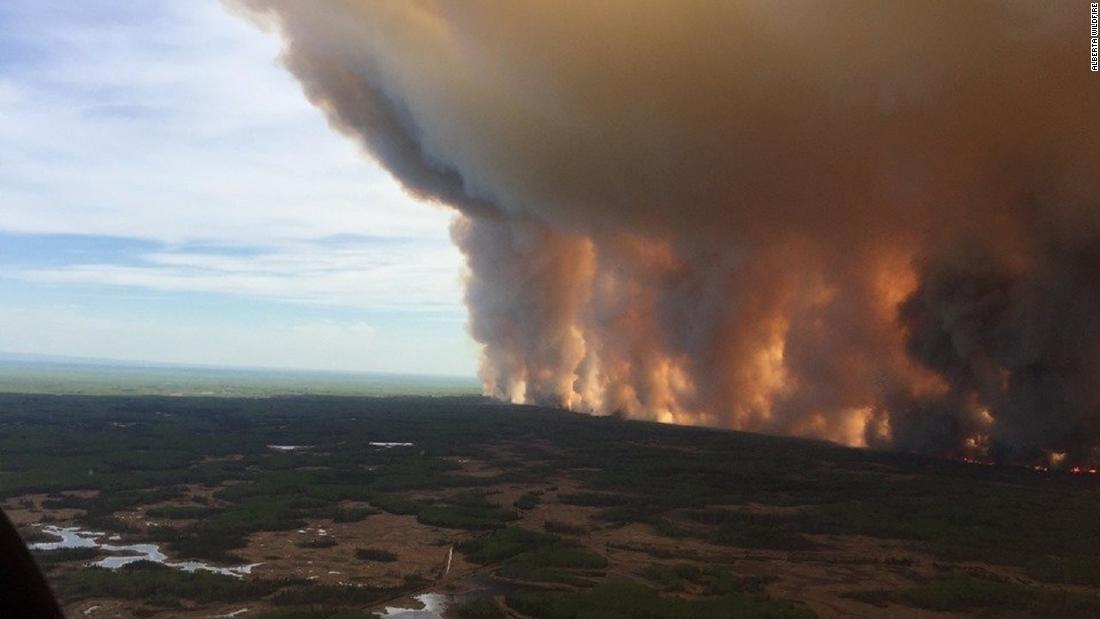
The Chuckegg Creek Wildfire, burning in Mackenzie County just three miles south of the town of High Level, has been torching ground for more than two days. It is just one of a "number of out-of-control wildfires" burning in the province, the government of Alberta said.
"Lock doors and windows, take small personal belongings including pets, identification, medication cash," the province's government said in an emergency alert. "Within your homes please ensure all fuel and gas appliances are shut off, and hot water tanks are turned down if able to."
Residents should be prepared to be away from home for at least 72 hours, officials said.
Mandatory evacuations are in effect for the town of High Level and the Dene Tha' First Nation communities of Bushe River and Meander River. The community of Chateh is under an evacuation alert, with high-risk individuals being evacuated.
The town of Slave Lake, where four new wildfires began Tuesday, also is on high alert. Three of the fires had been extinguished and one was "being held," officials said Tuesday night. The city's hotels are packed with evacuees fleeing the fire in High Level.
"The wildfire danger remains extreme for the Slave Lake Forest Area," the government said.
Level 6 out of 6
The wildfire is a level 6 out of 6 on the fire intensity scale, "meaning that the fire is jumping crown to crown of trees," Premier Jason Kenney said during a fire update.
There are about 90 firefighters and staff on the ground, 25 helicopters, air tankers and 10 structural protection units and heavy machinery fighting the fire, which is still out of control, Alberta Wildfire said.
And with continuing hot and dry condition, the danger will only increase, officials said.
Late Tuesday, Alberta Health Services issued a special air quality statement for Mackenzie County warning the "smoke is causing poor air quality and reducing visibility."
"Individuals may experience symptoms such as increased coughing, throat irritation, headaches or shortness of breath," the statement said. "Children, seniors, and those with cardiovascular or lung disease, such as asthma, are especially at risk."
Communities helping each other
No injuries or damaged homes had been reported by late Tuesday, Kenney said. But already community members are stepping up to help the residents that have been temporarily displaced by the wildfire.
TELUS, a Canadian telecommunications company pledged $50,000 in-kind and cash donations including "comfort kits, phone chargers and donations from TELUS community boards." The company also said it would be waiving overage charges for affected customers.
In Alberta, a restaurant owner who lost all her possessions in the 2011 Slave Lake wildfire -- which burned down half of a Canadian town with nearly 10,000 residents -- kept her business open until early morning hours to feed wildfire evacuees.
"That's Alberta," Alberta Minister of Municipal Affairs Kaycee Madu said in a tweet.
Volunteers are also checking homes for pets left behind, Crystal McAteer, the mayor of High Level said.
"I am ... concerned about the pets some people left at home, in their garages and back yards, when they evacuated," she said in a statement. "We have volunteers who can check on your pets and ensure they are safe, watered and fed."
Bagikan Berita Ini















0 Response to "Wildfires force nearly 5,000 Canadians out of their homes as firefighters continue to battle growing blazes"
Post a Comment